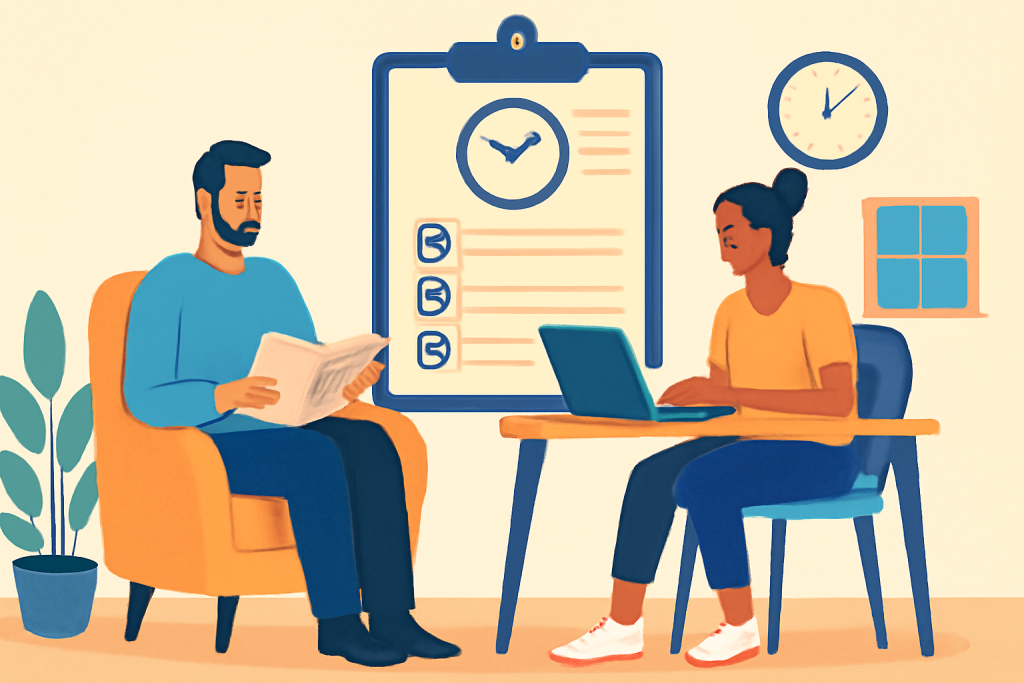Feeling overwhelmed by constant stress? Creating a consistent routine might be the most effective, low-cost tool to calm your mind and improve mental health. With modern life throwing more unpredictability than ever, a reliable daily structure is gaining attention for its powerful role in managing stress and boosting well-being.

Stress is considered a global health crisis with over 70% of adults reporting daily stress levels that impact their mental and physical health (American Psychological Association 2023). Modern challenges—like remote work blur, economic uncertainties, and social isolation—only intensify the pressure on our minds.
In this chaotic environment, establishing a routine serves as a grounding anchor, helping individuals regain control and reduce feelings of anxiety. When our day-to-day life follows a predictable pattern, it allows the brain to conserve energy, avoid decision fatigue, and better handle unexpected challenges.
The Science Behind Routine and Stress Reduction
Research has shown that routines influence the brain’s stress response system. Consistent habits help regulate the hypothalamic-pituitary-adrenal (HPA) axis, which controls cortisol levels—the primary hormone released during stress. When cortisol fluctuates less dramatically due to stable routines, individuals experience fewer anxiety symptoms and improved mood regulation (McEwen 2021).
Moreover, routines enhance sleep quality, nutrition, and exercise habits—three pillars critical to stress resilience. For instance, going to bed and waking up at the same time daily stabilizes the circadian rhythm, which is crucial for mental clarity and emotional balance (Walker 2017).
Emerging Trend: Personalized Routines Backed by Technology
One of the newest trends in stress management is the use of digital health platforms and apps to design personalized routines that fit individual lifestyles and stress triggers. These platforms integrate behavioral science and AI to suggest daily schedules that include optimal work, relaxation, and physical activity periods.
For example, apps like Fabulous and Headspace now offer routine-building tools that send reminders, track progress, and even adapt plans based on mood inputs or sleep patterns. This trend capitalizes on the growing demand for tech-enabled wellness solutions that are both effective and easy to implement (Harvard Health Publishing 2024).
Practical Steps to Create a Stress-Busting Routine
Implementing a routine doesn’t mean your day becomes rigid or boring. It means strategically designing habits to reduce stress while promoting productivity and joy. Here’s how to get started:
- Set Consistent Wake-Up and Sleep Times: Aim for 7-9 hours of sleep by sticking to fixed times, even on weekends.
- Schedule Daily Physical Activity: Exercise is proven to lower cortisol levels. Even a 20-minute walk daily can make a difference.
- Block Time for Mindfulness or Meditation: Just 10 minutes of deep breathing or meditation reduces anxiety and improves focus.
- Plan Meals and Hydration: Consistent, healthy eating patterns stabilize blood sugar, helping to prevent mood swings.
- Create ‘Transition’ Rituals: Start and end work with a ritual like journaling or stretching to mentally separate work from personal time.
- Limit Screen Time Before Bed: Avoid devices at least 30 minutes before sleep to improve rest quality.
- Build in Social Connection: Regular chats with friends or family boost emotional resilience.
By incorporating these habits gradually, you build a routine that buffers daily stress and improves long-term mental health.
The Psychological Benefits of Routine: Stability in an Unstable World
Routine provides predictability that fosters a sense of security and control, which are often lacking during times of uncertainty. This psychological comfort helps reduce stress hormones and allows individuals to focus cognitive resources on positive activities rather than worry (APA 2023).
Furthermore, routines can improve self-efficacy—the belief in one’s ability to manage life’s demands. Each completed task or maintained habit boosts confidence, which in turn lowers perceived stress.
Workplace Routines: Why They Matter More Than Ever
With hybrid and remote work becoming the norm, many people struggle with blurred boundaries and erratic schedules. Establishing a work routine within the home environment can drastically reduce work-related stress.
Employers are now encouraging employees to adopt routines like scheduled breaks, set work hours, and daily task lists. This not only enhances productivity but also reduces burnout and fatigue. Research shows employees with structured routines report 25% less stress and greater job satisfaction (Gallup 2024).
Common Barriers to Routine and How to Overcome Them
While routines are beneficial, some face challenges sticking to them. Common obstacles include:
- Unpredictable work hours
- Family caregiving responsibilities
- Lack of motivation or energy due to stress itself
To overcome these, experts suggest:
- Starting small: Build routines around one or two key habits initially.
- Flexibility: Allow for adjustments so routines feel supportive, not restrictive.
- Accountability partners: Share goals with friends or join online groups.
- Use of reminders and habit trackers: Technology can nudge consistent behavior.
Conclusion: Why Routine Should Be a Central Part of Your Stress Management Strategy
In today’s fast-paced world, routine has emerged as a critical, research-backed tool for managing stress effectively. It creates predictability, supports healthy habits, and fosters mental resilience. With the rise of personalized digital wellness tools, building a routine tailored to your lifestyle has never been easier or more practical.
Incorporate routine into your daily life now and experience the tangible benefits of reduced stress and improved well-being.
References
- American Psychological Association (APA) (2023) ‘Stress in America 2023: A National Mental Health Crisis.’ Available at: https://www.apa.org/news/press/releases/stress/2023/stress-in-america (Accessed: 20 May 2025).
- McEwen, B.S. (2021) ‘Neurobiology of Stress: From Serendipity to Clinical Relevance,’ Neuron, 109(3), pp. 363-379. https://doi.org/10.1016/j.neuron.2020.11.024
- Walker, M. (2017) Why We Sleep: Unlocking the Power of Sleep and Dreams. New York: Scribner.
- Harvard Health Publishing (2024) ‘Using Technology to Build Healthy Habits.’ Harvard Medical School. Available at: https://www.health.harvard.edu/blog/using-technology-to-build-healthy-habits-202401 (Accessed: 20 May 2025).
- Gallup (2024) ‘The Future of Work and Employee Well-being.’ Gallup Workplace Report. Available at: https://www.gallup.com/workplace/350270/future-work-employee-wellbeing.aspx (Accessed: 20 May 2025).









